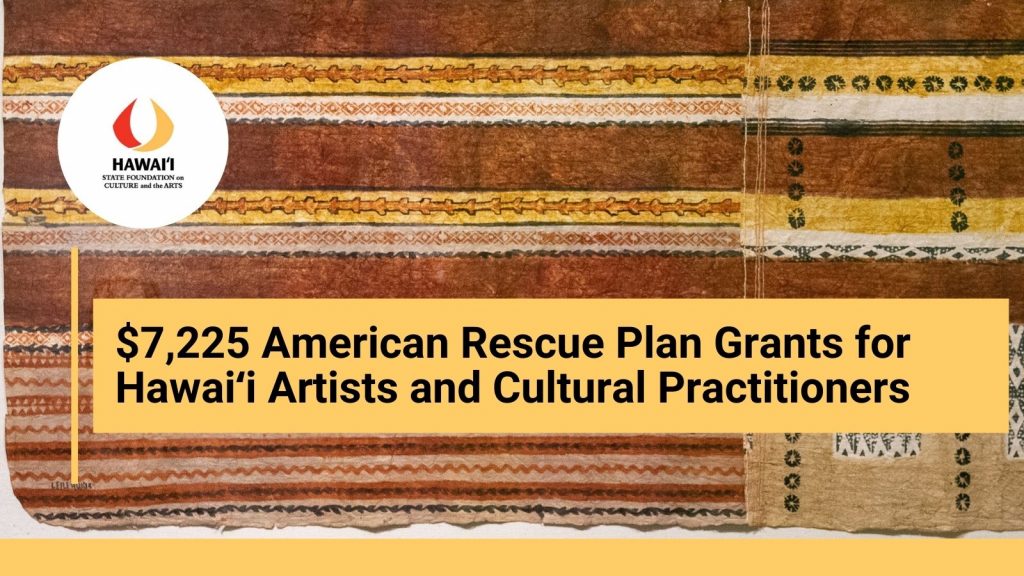The State Foundation on the Culture and the Arts will utilize American Rescue Plan (ARP) funding to administer two grants benefiting the state’s arts community: one for nonprofit organizations and one for individual artists and cultural practitioners.
The National Endowment for the Arts provided funds received from the American Rescue Plan to the State Foundation on Culture and the Arts (SFCA) to distribute to the arts and culture community throughout the State of Hawaiʻi. This emergency funding is designed to support the arts sector as it recovers from the devastating impact of COVID-19.
The State Foundation on the Culture and the Arts will utilize this funding to administer two grants benefiting the state’s arts community: one for nonprofit culture and arts organizations and one for individual artists and cultural practitioners.
The American Recovery Plan (ARP) Individual Artist Grant 2022 is closed. The application deadline was September 30, 2021.
Applicants who have questions may email our Staff at: [email protected]
Approximate timeline for applications that were successfully submitted by the application deadline:
The SFCA American Rescue Plan (ARP) Recovery Grant Individual Artist 2022 is for qualified individual artists to implement projects that have community impact in the State of Hawaiʻi.
A wide range of arts disciplines and cultural arts are possible. See section below: Examples of Projects/Activities.
Individual artists who are eligible may apply for this grant. Eligible individual artists meet the eligibility criteria listed below and are actively practicing as:
We recommend that you begin your registration or update your registration in Hawaiʻi Compliance Express immediately. Please make sure that you are compliant by the application deadline. You are required to upload your compliant certificate with your application.
Exception as of 8/5/2021 – Pursuant to the Governor’s Emergency Proclamation, signed August 5, 2021, §103-53, Hawaii Revised Statutes (HRS), Internal Revenue Service (IRS) tax clearances are suspended with conditions. Due to delays in IRS federal taxes compliance, the Governor’s Emergency Proclamation of 8/5/2021 allows state offices to accept non-compliant certificates IF the only non-compliant item listed is Internal Revenue Services as either “Submitted” “Pending”. Please note this is an Emergency Proclamation and could change or be extended at any time, including at the time of contracting awards approved for funding.
Note: Your identifying information in Hawaiʻi Compliance Express for the compliance certificate must match exactly your identifying information in Form W-9 that SFCA will need for contracting grants that are approved for funding.
The recovery grant supports a stipend/fee for the Individual Artist applicant to carry out a project or activity.
Hawaiʻi Go Smart is SFCA’s online system to manage several of the agency’s calls for application. Each call for applications is a cycle. The system allows us to do the following:
Detailed application information and instructions will be linked in Go Smart for you to access.
This information is required in your GO Smart Applicant Profile when you register for your login.
These data are used to provide SFCA with an overview of areas served statewide with arts and culture, by districts. For Congressional Districts: https://www.govtrack.us/congress/members/HI#representatives
Hawai’i has two congressional districts. The 1st District encompasses urban Honolulu and its immediate suburbs – District 1 is Representative Ed Case. The 2nd District includes the rest of Oʻahu and all other islands – District 2 is Representative Kaialiʻi Kahele. Both Senators serve the entire state.
For State Senate and House Districts: https://www.capitol.hawaii.gov/findleg.aspx
Yes.
It depends.
No: if the project that you are proposing as an individual artist for this grant is the same and your artistic/cultural services are the same as the project that is contracting you.
Yes: if the project that you are proposing as an individual artist for this grant is different from the project that is contracting you, or if the artistic/cultural services that you are providing are different.
If you have more questions about this scenario, email us at [email protected].
Each grant request is $7,225.
If you application is approved for funding, you will receive $7,225.
SFCA can fund twenty (20) individual artist grants.
Each grant is for an individual artist stipend/fees to support a project that has community impact.
The total grant amount must be spent within the grant implementation period, which is January 1 through June 30, 2022.
Yes. Please keep good records and receipts to support grant funds spent on individual artist stipend/fees during the grant implementation period.
Examples include and are not limited to:
Yes (for example – performance admission, workshop fees).
Your project activities can describe both. You will be the grant recipient which means that if you are funded, the grant will be contracted to you. The grant’s artist stipend/fees are paid to you, and you can pay your musician partners.
The grant’s artist stipend/fees will compensate you for time but not for supplies/materials or any travel costs.
Yes. For example, the facility where you present, perform, or teach can provide the space, technical support, supplies/materials, and so forth.
Yes. There will be a section for Application Support Materials (i.e. work samples or work evidence) in the application.
If you choose to submit a 5-page PDF of work evidence to support your application, here are a few ideas for each page:
Examples include and are not limited to:
Examples include but are not limited to:
All questions are subject to review by the Hawaiʻi State Ethics Commission.
